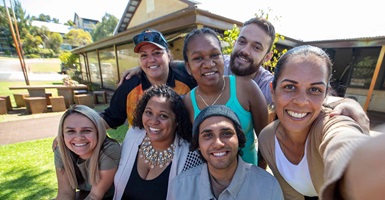Mindfulness is a skill that simply means being in the present and accepting things for what they are without reacting or judging. It has been increasing in popularity in recent years and deservedly so. Originally developed as a mood-regulation tool, researchers soon cottoned on to its many other benefits. .
These include the fact that people who practise mindfulness regularly are generally less forgetful, and more focused. They also tend to respond more calmly and bounce back faster from life’s challenges. And they’re usually happier, less stressed and enjoy healthier relationships, too.
Perks like that are exactly why Chisholm Student Services began offering mindfulness sessions.
“It’s about encouraging students to take time for self-care amidst their busy schedule, and to be kind and compassionate to themselves,” says Student Services Personal Counsellor, Jeya Arumugam, who facilitates the sessions. “Because, while it’s normal for our brains to switch to autopilot as we go about our daily tasks, learning to focus our attention on one thing and be fully aware of the present moment can improve concentration and gradually help us feel more confident to manage difficult situations.”
How to be mindful
The good news is that while mindfulness was developed based on the principles of Buddhist meditation, you don’t have to meditate to do it. And that means you can find opportunities to practise being mindful almost everywhere you look, using the following steps:
Zero in. Begin by making a conscious decision to focus solely on an activity – for argument’s sake, let’s choose washing the dishes, a task that can genuinely calm the mind and decrease stress when you do it mindfully, according to one US study. Give your dishwasher a day off and wash things by hand.
Focus. Instead of tuning out as soon as you turn the tap on, running through tomorrow’s to-do list, or staring out the window daydreaming about whatever catches your eye, pay close attention to the feelings and sensations you experience in the moment. Things like the smell of the dishwashing liquid, the warmth of the water and how the dishes feel in your hands.
Don’t judge. Whatever you experience and notice, resist the urge to label it as good or bad or right or wrong. Try to stay neutral – yep, even if you splash water all over yourself.
Let it go. Be mindful of your thoughts wandering or of your attention being caught by something else. Notice it happening without judgement, then try to let it go, using the next dish you pick up to wash as an anchor to pull your thoughts and focus back to the task at hand.
Mindfulness requires regular practice to reap the biggest reward, so if you need help developing a mindfulness habit or aren’t sure where or how to get started, take advantage of Student Services’ sessions which are being held via Zoom. “By giving half-an-hour of your time to join at least one mindfulness session, you’ll be doing yourself a big favour,” says Jeya. “Trust me, you won’t regret it.”
This blog was originally published in May 2020 and has been updated.


